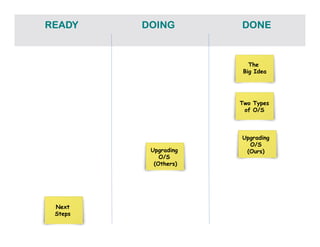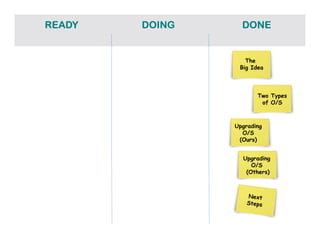This App Won't Work With My O/S
- 1. Sue Johnston It’s Understood / Leanintuit AGILE + BEYOND 2017
- 2. PLEASE NOTE SLIDES ≠ PRESENTATION • These slides are designed to be viewed in conjunction with human beings talking and interacting with you. • They may make little sense to you if you were not at the live session. • Stilll, if they’re useful to you, I’m happy.
- 3. Once upon a time . . .
- 5. “Have an Android? Sign up for our wait list.” More recently . . . “Have a Blackberry? Sorry. Can’t help you.”
- 6. Does BlackBerry’s first Android Handset Deserve a Place in your Pocket? We Reckon So BlackBerry May Win You Back with Android And then, one day . . .
- 7. The Big Idea Two Types of O/S Upgrading O/S (Ours) Upgrading O/S (Others) Next Steps READY DOING DONE
- 8. “Our Age of Anxiety is, in large part, the result of trying to do today’s jobs with yesterday’s tools and concepts.”“We shape our tools and, afterwards, our tools shape us.” “Most of our assumptions have outlived their usefulness.” Marshall McLuhanThe Big Idea
- 9. “Your mindset is what ultimately shapes the results you get for yourself and the groups you're trying to help. Your mindset is like a computer operating system.” Roger Schwarz The Big Idea
- 10. VALUES BELIEFS PRINCIPLES PRACTICES THINKING ACTION Guide us to Inform + support OPERATING SYSTEM
- 11. RIGID MINDSET
- 13. NEW IDEA NEW IDEA NEW IDEA NEW IDEA NEW IDEA AGILE MINDSET
- 15. The Big Idea
- 16. The Big Idea Two Types of O/S Upgrading O/S (Ours) Upgrading O/S (Others) Next Steps DOING DONEREADY
- 17. Unilateral Control Fixed Mindset Limiting Mindset TRADITIONAL O/S Mutual Learning Growth Mindset Transforming Mindset AGILE O/S Two types of O/S
- 18. Values Assumptions Unilateral Control • Be right • Win. Don’t lose • Minimize expressions of negative feelings • Act rational • I understand the situation; those who disagree don’t • I have pure motives. Those who disagree have questionable motives • My feelings and behaviour are justified • I am not contributing to the problem
- 19. Behaviour Unilateral Control • State views without asking for others’ views • Withhold relevant information • Speak in general terms without defining specific words • Keep reasoning private; don’t ask others about their reasoning • Focus on positions • Act on untested assumptions as if they were true • Control the conversation • Avoid, ease into, or save face on difficult issues
- 20. Values Assumptions Mutual Learning • Curiosity • Informed Choice • Accountability • Transparency • Compassion • I have information; so do other people • Each of us sees things others don’t • People may disagree with me and still have pure motives • Differences are opportunities for learning • I may be contributing to the problem
- 21. Mutual Learning Behaviour • State views and ask genuine questions • Share all relevant information • Use specific examples and agree on what words mean • Explain reasoning and intent • Focus on interests, not positions • Test assumptions and inferences • Jointly design next steps • Discuss “undiscussable” issues
- 22. EXERCISE PART ONE On your own: • Think of some beliefs that prevail in the organizations you work in or with. • Write them on sticky notes – 1 belief per sticky. • 5 minutes BELIEF BELIEF
- 23. UNILATERAL CONTROL MUTUAL LEARNING PART TWO • In table groups, place the stickies on the posters, matching attitudes/behaviours with the appropriate O/S or mindset. Add new stickies if you like. • Discuss implications, results, impact of these actions or phrases with your tablemates. • 10 minutes EXERCISE
- 24. The Big Idea Two Types of O/SUpgrading O/S (Ours) Upgrading O/S (Others) Next Steps DOING DONEREADY
- 25. UPGRADING 0/S - OURS
- 26. When was the last time you met an idiot who agreed with you? Do people disagree because they’re idiots? Or are they idiots because they disagree? UPGRADING 0/S - OURS
- 27. • Think of a result you want to achieve for yourself. • Look at behaviours you’ve employed in trying to reach it. UPGRADING 0/S - OURS ! ?
- 28. • Think a result you want to achieve for yourself. • Look at behaviours you’ve employed in trying to reach it. MUTUAL LEARNING BEHAVIOURS 1. State views and ask genuine questions 2. Share all relevant information 3. Use specific examples and agree on what important words mean 4. Explain reasoning and intent 5. Focus on interests, not positions 6. Test assumptions and inferences 7. Jointly design next steps 8. Discuss undiscussable issues. UNILATERAL CONTROL BEHAVIOURS 1. State views without asking for others’ views 2. Withhold relevant information 3. Speak in general terms and don’t define specific words 4. Keep reasoning private; don’t ask others about their reasoning 5. Focus on positions 6. Act on untested assumptions as if they were true 7. Control the conversation 8. Avoid, ease into or save face on difficult issues UPGRADING 0/S - OURS
- 29. The Big Idea Two Types of O/S Upgrading O/S (Ours)Upgrading O/S (Others) Next Steps DOING DONEREADY
- 30. Upgrade O/S - Others
- 31. Upgrade O/S - Others
- 32. Paradox? You look smart when you ask questions. Upgrade O/S - Others
- 33. What is holding us back? Is it a fact or is it a belief? How do we know? What might be possible if we didn’t believe that? Could something else be true? How could we find out? Useful Questions UPGRADING 0/S - OTHERS
- 34. EXERCISE
- 35. Identify when Unilateral Control is in play Explore what you may not be seeing Upgrade O/S - Others
- 36. Make learning activities visibleUPGRADING 0/S - OTHERS Spread virally - set example “People like me” Invite people to participate Invite mutual learning
- 37. You can start a movement Upgrade O/S - Others
- 38. Derek Sivers - https://www.youtube.com/watch?v=fW8amMCVAJQ
- 39. The Big Idea Two Types of O/S Upgrading O/S (Ours) Upgrading O/S (Others) Next Steps DOING DONEREADY
- 40. ! INTENTION ATTENTION Next Steps WARNING: Changing O/S can create friction
- 41. • Identify something you and your team or organization do that no longer serves a useful purpose: • Can you trace that back through the mindset model? • What principle does it serve? • What belief does that flow from? • How can you change that belief? HOMEWORK
- 42. Your intention – in a sentence or two. email@wherever.com Optional follow-up reminder Next Steps
- 44. The Big Idea Two Types of O/S Upgrading O/S (Ours) Upgrading O/S (Others) DOING DONEREADY













































